| Sofie: (Evelyn) last time I saw you they were carting you off...shell shocked. 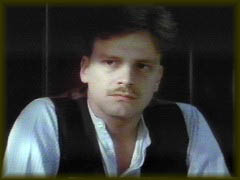 I
was reading a book for school called Trauma and Recovery. It is written
primarily for people who are in the mental health field. It has some
interesting
information about the history of emotional trauma and how society
viewed
it and treated it during WWI. There was a terrible stigma attached to
any
emotional symptoms that were debilitating to the soldier. Treatment was
cruel and humiliating. The scene where Moon says how hard it is for the
"intact ones" like himself and Tom. They are far from intact and will
likely
suffer some symptoms for the rest of their lives. I
was reading a book for school called Trauma and Recovery. It is written
primarily for people who are in the mental health field. It has some
interesting
information about the history of emotional trauma and how society
viewed
it and treated it during WWI. There was a terrible stigma attached to
any
emotional symptoms that were debilitating to the soldier. Treatment was
cruel and humiliating. The scene where Moon says how hard it is for the
"intact ones" like himself and Tom. They are far from intact and will
likely
suffer some symptoms for the rest of their lives.
I really liked the hymn that was playing when he goes in to find a table from where he can watch her through the window. I recognized it and racked my brain till I found out what it was. "To a Wild Rose" by I think McDowell?(American) It doesn't necessarily mean anything, except to me. I love when a movie makes me this curious about details. Love the scene when he's lying in the sun in the graveyard. She tells him she's been there ten minutes. Doing what exactly? I know what I would be doing. Gi: Karen:
One criticism: The scene where Tom is watching the church service from the belfry and sarcastically comments on the Reverent Keach's (and by implication at this point, the entire congregation's) lack of Christian charity I found a little heavy handed. I think you get the idea that the Reverend's words are hollow from their initial meeting and don't need Tom to spell it out. Evelyn: Have you figured out what is in Moon's suitcase yet? Sofie:
Lewis Yealland (British psychiatrist of the traditional view) advocated treatment strategy based on shaming, threats, and punishment. Hysterical symptoms such as mutism, sensory loss, or motor paralysis were treated with electric shocks. Yealland reports treating a mute patient by applying electric shocks to his throat. Treatment went on for hours until patient finally spoke. While shocks were applied Yealland exhorted the patient to "remember, you must behave as a hero and have better control over yourself." Within a few years after end of war, numerous men with long-lasting psychiatric disabilities became an embarrassment to civilian society eager to forget. Judith Herman, M.D. goes into great detail primarily to help clinicians recognize symptoms of trauma so that more accurate diagnosis can be made which will lead to more appropriate treatment. I hope this info is helpful. I found it helped me understand Birkin and Moon. They were damaged by war but their wounds were cause for shame not heroism. Evelyn: OK, the Book: "...good old Bannister-Fletcher, our bible in Miss Witherpen's English Architecture class." (p.16)
The walk in the woods, paradise, the rabbit, the shot: Not in the book. The last scene as an old man. Not in the book. The whole book is a flashback "Mrs Ellerbeck says you're very attractive...." "Attractive!" she said, as though this had never occurred to her or that no-one had told her so before... "You are attractive," I said "Attractive?" she repeated helplessly.... All right, Alice Keach, I thought, you're going to be pushed. You can lie awake in the dark too. "Many men would say you are more than attractive," I said. "They'd say you were beautiful." (I stopped short of `I') "...And you?" she said. "Me! Well, I'm not an artist, but they gave me a diploma at L.C.A. with a cast-iron guarantee that I could recognize Beauty whenever my eyes fell thereon. So, professionally, I must tell you, 'Yes, you're beautiful. Very.' And could she have made herself go that bit further and given me the nod, I would have recited a catalogue of her charms...because my blood was up." (p.95) [Then Mossop stepped in.] This scene reminds me of the visit to Lizzy at Rosings....when he almost....commits himself!! He does repression so well. (Bethan) the day he almost declared his love "She also turned so that her breasts were pressing against me. And, although we both looked outwards across the meadow, she didn't draw away as quite easily she could have done.
"She drew back and said shakily, 'Well, thank you for showing me [the mural]....Arthur will be wondering what's become of me. No, please don't come down.' "(p.106) Karen: Nothing in the book about Moon's suitcase. But after Sophie's research, it must have been medication ...vials? Sofie: It is interesting how little things have changed. Society seems more accepting of mental illness but there is still a great deal of blaming the victims of traumatic experiences. Karen: (Re: Suitcase/Medals) Evelyn:
Then I mentioned Moon.... ...the M.P.s found him in bed with his batman..... They really shat on him at the Court-Martial. Crucified him. "Corruption of young men"... "Dishonour of the king's commission..." that sort of balls. His M.C. [Military Cross] made it worse. Can't understand that. "He's never mentioned an M.C." I said. "Immediate award. Brought in one of his chaps from the wire. Went back when he heard another screaming....Poor bugger! I suppose he was born that way." "Knowing Moon was a homosexual didn't upset me, though of course it wasn't something I could forget. It was the idea of an independent man, a proud spirit, being shut up like an animal in a military prison...that's what appalled me. (pp.90-1) Then later at the pub - in the film - Moon says the last six months were the worst when he didn't see any corpses. Tom: "You got the M.C., didn't you. I saw it in the tent"!! So Moon was court-martialed and spent the last six months of the war in the "glasshouse" as Milburn says. Like Sofie says he is ashamed of the medal probably because of the court-martial. (I think in the US anyone court-martialed is stripped of his medals.) I also rescind my perception that Rev. Keach is impotent. Can't find any reference to assume that. CF portrays Tom perfectly. Natasha Richardson plays her a bit more of a temptress. (Or perhaps that is how Pat O'Connor (CofF), the director saw her.) The apples symbolism in the book are not as graphic as in the film. No fondling, etc. Though I am sure "the Eve factor" is what they are supposed to represent. I really prefer the film. (Of course, CF is in it!) And I admire the director for getting a two-hour film out of a 110 page book!! Bethan:
Heide: (Sofie) I found it helped me understand Birkin and Moon.
They were
damaged by war but their wounds were cause for shame not heroism. (Book) "And could she have made herself go that bit further
and given
me the nod, I would have recited a catalog of her charms, because my
blood
was up." "I should have lifted an arm and taken her shoulder, turned
her face
and kissed her. Then everything would have been different. My life,
hers." (Evelyn) I also rescind my perception that Rev. Keach is
impotent. Only 110 pages!!! What a disappointment. Evelyn: "I was married. Vinny had gone off with him but neither of us had done much about it. She'd shrewdly left the door open so that, if need be, she could slip back - before she went again. And Alice Keach. I was sure that she was a deeply religious woman: marriage for her really did mean `Let no man put asunder.' Never forget this was 1920, another world. "So there it was and there it would stay until the day I would go. Then, for a year or two, perhaps we'd exchange a polite Christmas card and, after that, we'd draw farther away. But now she was here and, unknowing, mine. Well, that's how I liked to think of it." (pp.92-3) Interesting line, end of first paragraph: "Later perhaps, but not then." Does he repent not having made the overture to Alice? What does everyone think? Was it his innate morality that made him hold back? (He was not a religious man.) No sex between the Reverend and Alice. I assume he was in the war until he was carted away shell shocked. Cheryl: Evelyn, from the quotes so far, I don't think I'm going to like the book's Birkin as much either :-) Karen: The "shock" of participants at the Great War also stemmed from Britain's threatened position as a world power, France's rapid demise, etc. The ability of upstart Germany to overrun Europe was the kicker and was horribly dealt with in the Treaty of Versailles (but of course that's with 20-20 hindsight).
Don't you love the ending? He takes the apple she gave him, looks at it tenderly seems to grasp it firmer, and then bites into it lustily. After doing Tom Birkin, I bet he could do Joe Prince in an afternoon! This film is held in v. high esteem...even among Kenneth Branagh fans. I'll give you another scene that was not in the film...after the scene in the belfry: "Then, towards evening, I pulled myself together and thought, 'Well usually there's a second chance for most of us; perhaps she's waiting there as I'm waiting here.' [He goes to the house, stood breathless, as if he had been running, but found the house empty.] 'They're not here', I thought, 'they've gone.' And I turned away. Then I remembered the bell....And I pulled at it...so that the bell's sounds came hurrying along corridors, round corners, down staircases, echoing and re-echoing, spreading through the dark and empty house like ripples of her laughter. But now I knew that it was laughter calling to me from the past - clearly, playfully, yet poignantly sad. It was the worst moment of my life. And I dragged at the wire again and again, savagely, despairingly. For how long I cannot say, but when, at last, I turned away and went, I knew I should never see her again." (pp.108-9) Karen: |
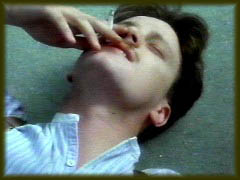 (Sofie)
Love the scene when he's lying in the sun in the graveyard. She tells
him
she's been there ten minutes. Doing what exactly?
(Sofie)
Love the scene when he's lying in the sun in the graveyard. She tells
him
she's been there ten minutes. Doing what exactly? 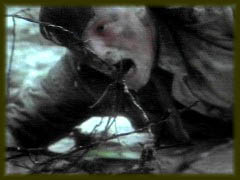
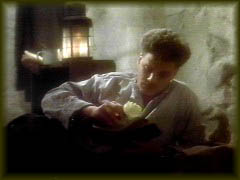 "That
rose, Sara Van Fleet...I still have it. Pressed in a book. My
Bannister-Fletcher,
as a matter of fact. Someday after a sale, a stranger will find it
there
and wonder why." (p.49)
"That
rose, Sara Van Fleet...I still have it. Pressed in a book. My
Bannister-Fletcher,
as a matter of fact. Someday after a sale, a stranger will find it
there
and wonder why." (p.49) 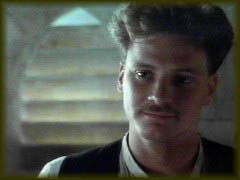 "I
should have lifted an arm and taken her shoulder, turned her face and
kissed
her....Then everything would have been different. My life, hers. We
would
have had to speak and say aloud what both of us knew and then, maybe,
turned
from the window and laid down together on my makeshift bed. Afterwards,
we would have gone away, maybe on the next train. My heart was racing.
I was breathless. She leaned on me, waiting. And I did nothing and said
nothing.
"I
should have lifted an arm and taken her shoulder, turned her face and
kissed
her....Then everything would have been different. My life, hers. We
would
have had to speak and say aloud what both of us knew and then, maybe,
turned
from the window and laid down together on my makeshift bed. Afterwards,
we would have gone away, maybe on the next train. My heart was racing.
I was breathless. She leaned on me, waiting. And I did nothing and said
nothing. 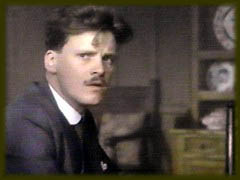 (About
Moon, at Ripon)
(About
Moon, at Ripon) 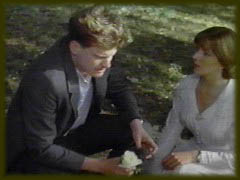 I
love watching this film, and think that virtually all the scenes have
some
intrinsic value. I'm always moved by the scene in the woods when Birkin
reacts to the gun shot, also by his reaction after seeing the dying
child,
when he himself also seems terribly ill. And I think that CF acts very
well with the children...they treat him as one of themselves. and he
treats
them as equals.
I
love watching this film, and think that virtually all the scenes have
some
intrinsic value. I'm always moved by the scene in the woods when Birkin
reacts to the gun shot, also by his reaction after seeing the dying
child,
when he himself also seems terribly ill. And I think that CF acts very
well with the children...they treat him as one of themselves. and he
treats
them as equals. 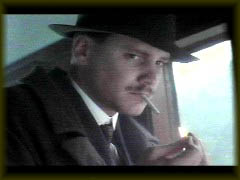 Evelyn:
Evelyn: